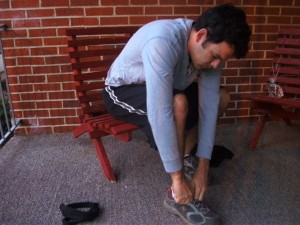Running is a part of my life, in fact, you might call it a part of my meditation routine. Like many athletes, I drift into a trance while jogging, running, or doing sprints. So when I became an honorary Muslim in August–right at the start of Ramadan–exercise came under threat.
Or did it…?
Ramadan is a holy time during the Islamic lunar calendar. Muslims fast during daylight hours for between 29 and 30 days and abstain from food, drink, sex, as well as any negative behavior. For athletes, nutrition is key for both survival and success in the gym, on the court, or in the field. How was I supposed to continue my workout during Ramadan–especially during this recent heat wave?
“The key lesson here is simply to be smart. Listen to your body,” says Shazly Khan, a certified personal trainer.
Listening to your body is a great idea, but mine is telling me to run and lift weights as usual. So if I’m not drinking fluids during the day does this become a struggle of mind over matter? Do I not only abstain from eating, drinking, and fooling around with my wife, but exercise as well?
Not necessarily. Like Mr. Khan said, listen to your body, because it’s the best indicator of what you can handle. He goes on to say:
“For me, its not really a question of “Should I train?” or not but rather what kind of workout and at what time I should do it. It is as straightforward as that.”
You might remember that I began a tradition with my Latter-day Saint Mentors where we run at a local high school track at 6:30 every Tuesday, Thursday, and Saturday morning. Given Shazly’s advice, this timing is actually perfect. Muslims eat the suhoor (morning meal around dawn) where they take in required calories and fluids for the day and then break the fast with the iftar dinner at sundown. Sure, that’s a long time between refueling sessions, but if you eat smart at the designated times, the substance you take in should carry you through.
Minnesota Vikings safety Husain Abdullah, a practicing Muslim and pro-football player, described his eating schedule during training in Ramadan on his Facebook page:
“Suhoor: Eggs, beef/turkey sausage/bacon. Oatmeal w/fruit. 2 coconut waters (Way better than Gatorade health wise and for electrolytes!), 1/2a Pedialyte and water
Dinner: Whatever is on the menu. Just make sure you hydrate again. I normally try and drink fluids until I can regularly use the bathroom. Stay away from things that can dehydrate you (soda, caffeine, etc.)
Late night lunch: Around 2 a.m. I’ll get up and drink some water and a Gatorade protein shake. Might eat a little fruit if I feel like it.”
He goes on to say that hydration is absolutely key, which is why he takes in fluids at every opportunity. Because I run with my Latter-day Saint Mentors at 6:30 in the morning, that means it’s long enough after suhoor to prevent cramps after eating, but soon enough where the heat of the day does not sap my water reserves. By the time my workout is over, my heart rate and metabolism are rockin’ and rollin’ for the better part of the day. Aside from hydration, protein intake is also very important, as protein builds and repairs muscle. Because I am a vegetarian, this means a lot of soy protein, beans, and shakes. A good multi-vitamin is also a great idea along with supplements like calcium and magnesium.
On the other end of the day (in case you like to snooze after waking for fajr prayers), you could also plan your workout an hour or two away before or after the iftar. If you exercise before, then you can refuel immediately afterward, whereas if you workout after iftar (as long as you don’t stuff yourself!), you’ll have plenty of fuel to work hard.
The main thing about Ramadan is discipline. It’s a time to build up your spiritual and physical endurance. Fasting is a time-tested method of focus on the essentials of life. Just halfway through Ramadan I have lost over five pounds and my appetite in general is shrinking. That may not sound like a lot, but it was five extra pounds I didn’t need. I’m discovering just how much waste there is in our diets in particular and our lives in general. How much of this food could feed the hungry, the poor? This is highly symbolic of the extra spiritual baggage we might carry around with us all year as well. Ramadan is a good time to expel that unneeded weight. What are you getting rid of this month?
“Woe to those who give short measure, who demand of other people full measure for themselves, but give less than they should when it is they who weigh or measure for others! Do these people not realize that they will be raised up on a mighty Day, a Day when everyone will stand before the Lord of the Worlds? ” Qur’an 83: 1-4


